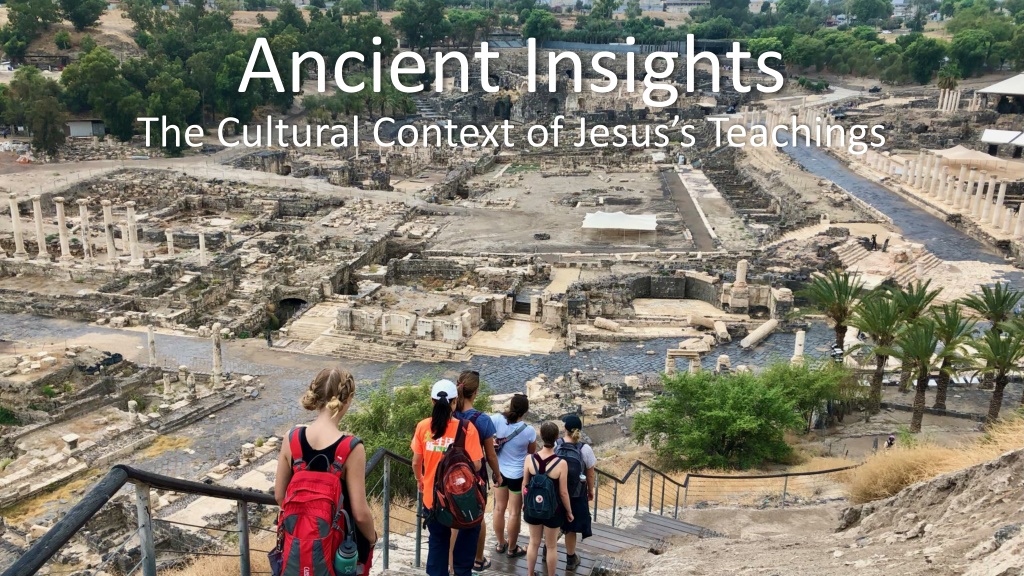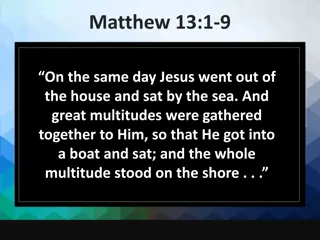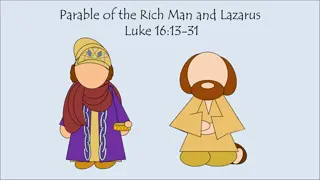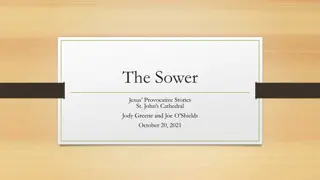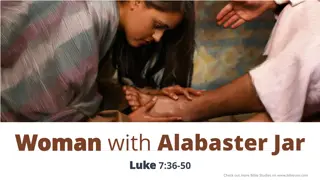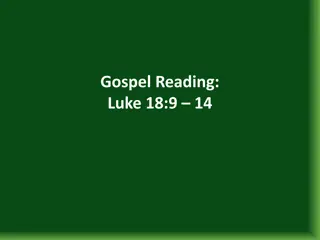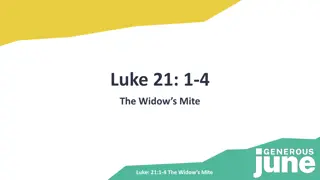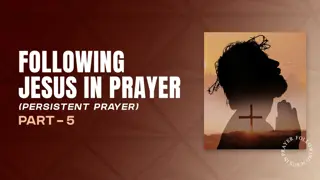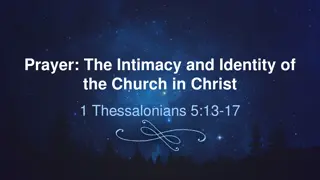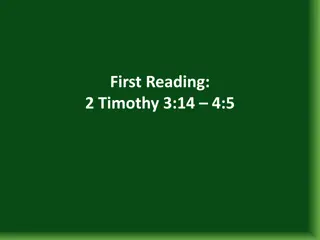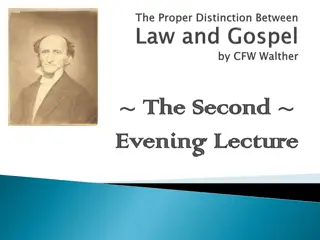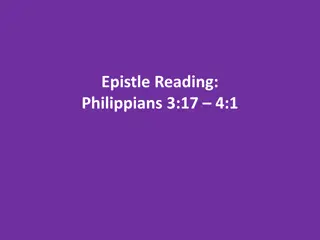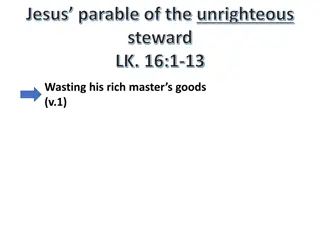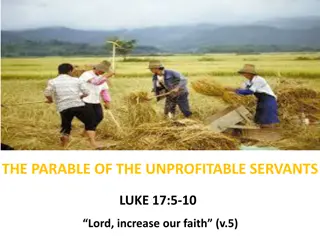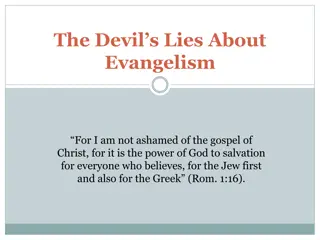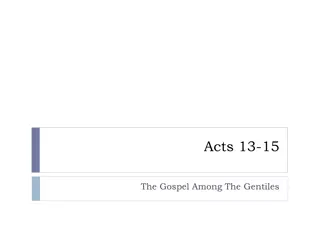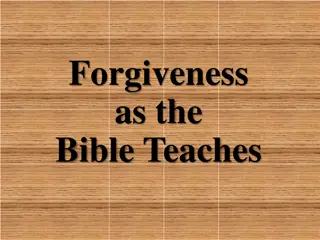Unveiling the Parable of the Persistent Widow in Luke's Gospel
Delve into the cultural context of Jesus's teachings through the lens of the Second Temple Period. Explore the Parable of the Persistent Widow in Luke, analyzing the significance of prayer, justice, and faith as portrayed in this narrative. Uncover the timeless message of perseverance and trust in divine justice conveyed through the characters of the persistent widow and the unjust judge.
Download Presentation

Please find below an Image/Link to download the presentation.
The content on the website is provided AS IS for your information and personal use only. It may not be sold, licensed, or shared on other websites without obtaining consent from the author. Download presentation by click this link. If you encounter any issues during the download, it is possible that the publisher has removed the file from their server.
E N D
Presentation Transcript
Ancient Insights The Cultural Context of Jesus s Teachings
Objective and Method 70 Faces of Scripture Different lenses reveal different insights. The teachings of Jesus in the Gospels reflect the culture of the day. Our Lens: Examine the culture of the Second Temple Period to shed light on Jesus s teachings.
The Parable of the Persistent Widow The Parable of the Unjust Judge
Literary Context This parable is only told in Luke. The Scene: Luke 17:20 21 Once Jesus was asked by the Pharisees when the kingdom of God was coming, and he answered, The kingdom of God is not coming with things that can be observed; nor will they say, Look, here it is! or There it is! For, in fact, the kingdom of God is among you.
Literary Context Just as it was in the days of Noah, so too it will be in the days of the Son of Man. They were eating and drinking, and marrying and being given in marriage, until the day Noah entered the ark, and the flood came and destroyed all of them... ...I tell you, on that night there will be two in one bed; one will be taken and the other left. There will be two women grinding meal together; one will be taken and the other left. Then they asked him, Where, Lord? He said to them, Where the corpse is, there the vultures will gather. Luke 17:26 27, 34 37
The Parable Then Jesus told them a parable about their need to pray always and not to lose heart. He said, In a certain city there was a judge who neither feared God nor had respect for people. In that city there was a widow who kept coming to him and saying, Grant me justice against my opponent. For a while he refused; but later he said to himself, Though I have no fear of God and no respect for anyone, yet because this widow keeps bothering me, I will grant her justice, so that she may not wear me out by continually coming. And the Lord said, Listen to what the unjust judge says. And will not God grant justice to his chosen ones who cry to him day and night? Will he delay long in helping them? I tell you, he will quickly grant justice to them. And yet, when the Son of Man comes, will he find faith on earth? Luke 18:1 8 (NRSV)
How have you interpreted this parable? How have you heard it interpreted?
Who is the central character of this parable? The Judge or the Widow?
Does Luke repurpose this Parable differently from how an original listener might have understood it? Luke 18:1 Then Jesus told them a parable about their need to pray always and not to lose heart. Luke gives interpretive commentary BEFORE narrating the parable.
Lukes Audience Written 93 120 CE (after Mark, after Paul) 2 Volume Set (Luke Acts) Commissioned by His Excellency, Theophilus. No consensus where it was written. Asia Minor seems logical (to me). Gentile Audience (2 3 generations removed) Experiencing loss of status/localized persecution Its been 60+ years. Is Jesus really coming back?
A Strange Conclusion And yet, when the Son of Man comes, will he find faith on earth? What does this line have to do with the parable? Some think this points to Luke s repurposing.
Narrative Structure (Chiasm) A A Activity of the widow (v 3) B Response of the judge (vv 4 5) B God s contrasting response (vv 6b 8a) Faith of the disciples (v 8b)
Widows in the Bible You shall not wrong or oppress a resident alien, for you were aliens in the land of Egypt. You shall not abuse any widow or orphan. If you do abuse them, when they cry out to me, I will surely heed their cry; my wrath will burn, and I will kill you with the sword, and your wives shall become widows and your children orphans. Ex 22:21 24
Widows in the Ancient World A Liminal Group Without social class or status Worse if they had no family Their dowry was their only (legal) asset.
Widows in the Ancient World Without power or property, their primary recourse was bold legal persistence. In the world of the Bible, the widow is not a nagging woman. She is a teacher, an instructor who perseveres until she trains or coaches the village assembly to apply the law with justice. In fact, the widow in this parable is the only one, human or divine, who is able to teach the village assembly how to carry out its judicial responsibilities and safeguard the land and children of its households (Luke 18:4). Without the widow there would be no justice. Matthews & Benjamin, The Social World of Ancient Israel, 133.
Dead Sea Scrolls Six Letters from Babatha, a Jewish widow. Dated to around 125 CE 3 in Nabatean, 3 in Aramaic In a legal battle with court-appointed guardians of her son s estate. Letters show her persistence in fighting for what belonged to her family. Widows fights were not against small claims, but over land, family, and children.
When you reap the harvest of your land, you shall not reap to the very edges of your field, or gather the gleanings of your harvest. You shall not strip your vineyard bare, or gather the fallen grapes of your vineyard; you shall leave them for the poor and the alien: I am the LORD your God. You shall not steal; you shall not deal falsely; and you shall not lie to one another. And you shall not swear falsely by my name, profaning the name of your God: I am the LORD. You shall not defraud your neighbor; you shall not steal; and you shall not keep for yourself the wages of a laborer until morning. You shall not revile the deaf or put a stumbling block before the blind; you shall fear your God: I am the LORD. You shall not render an unjust judgment; you shall not be partial to the poor or defer to the great: with justice you shall judge your neighbor... You shall not take vengeance or bear a grudge against any of your people, but you shall love your neighbor as yourself: I am the LORD. Lev 19:9 15, 18
A Familiar Story? When a poor old woman insisted that her case should be heard before him, and often caused him annoyance, he said he had no time to spare, whereupon she burst out, Then give up being king. Philip, amazed at her words, proceeded at once to hear not only her case but those of the others. Sayings of Kings and Commanders, Philip the Father of Alexander the Great (Plutarch, 46 119 CE) What does this story tell us about expectations for rulers/judges?
Jewish Second Temple Literature Do not offer him a bribe, for he will not accept it; and do not rely on a dishonest sacrifice; for the Lord is the judge, and with him there is no partiality. He will not show partiality to the poor; but he will listen to the prayer of one who is wronged. He will not ignore the supplication of the orphan, or the widow when she pours out her complaint. Do not the tears of the widow run down her cheek as she cries out against the one who causes them to fall? The one whose service is pleasing to the Lord will be accepted, and his prayer will reach to the clouds. The prayer of the humble pierces the clouds, and it will not rest until it reaches its goal; it will not desist until the Most High responds and does justice for the righteous, and executes judgment. Wisdom of Ben Sirach 35:14 22
Jewish Second Temple Literature Do not offer him a bribe, for he will not accept it; and do not rely on a dishonest sacrifice; for the Lord is the judge, and with him there is no partiality. He will not show partiality to the poor; but he will listen to the prayer of one who is wronged. He will not ignore the supplication of the orphan, or the widow when she pours out her complaint. Do not the tears of the widow run down her cheek as she cries out against the one who causes them to fall? The one whose service is pleasing to the Lord will be accepted, and his prayer will reach to the clouds. The prayer of the humble pierces the clouds, and it will not rest until it reaches its goal; it will not desist until the Most High responds and does justice for the righteous, and executes judgment. How do you see the parable reflected in this passage? Wisdom of Ben Sirach 35:14 22
The Parable In a certain city there was a judge who neither feared God nor had respect for people. In that city there was a widow who kept coming to him and saying, Grant me justice against my opponent. For a while he refused; but later he said to himself, Though I have no fear of God and no respect for anyone, yet because this widow keeps bothering me, I will grant her justice, so that she may not wear me out by continually coming. And the Lord said, Listen to what the unjust judge says. And will not God grant justice to his chosen ones who cry to him day and night? Will he delay long in helping them? I tell you, he will quickly grant justice to them. And yet, when the Son of Man comes, will he find faith on earth?
Who is the main character? A A Activity of the widow (v 3) B Response of the judge (vv 4 5) B God s contrasting response (vv 6b 8a) Faith of the disciples (v 8b) Both characters offer important teachings!
Lessons Widow: A model for God s people. Decry injustice. Maintain faith in God. Judge: A Qal Wahomer comparison (how much more...) A reassurance about God s faithfulness A reaffirmation of Sirach 35:14 22 using a familiar type of story.
What do you make of the last line? And yet, when the Son of Man comes, will he find faith on earth?
Summary God is more faithful than any human Judge. Like widows challenge their communities to pursue justice, so too should the people of God. God hears the persistent cries of the oppressed and persecuted.
Next Week The Parable of the Rich Man and Lazarus Read Luke 16:19 31 What s the point of this parable? Does this parable tell us anything about the afterlife?
